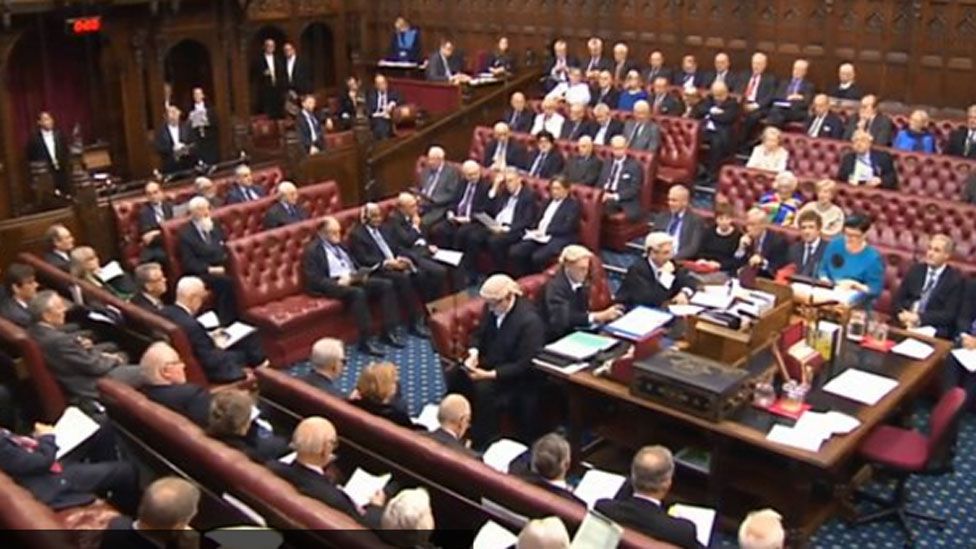Scotland Bill: House of Lords continues scrutiny of new devolution powers
- Published

The House of Lords has resumed its detailed scrutiny of the Scotland Bill on new powers for the Scottish Parliament.
The bill is currently at the committee stage, with peers due to subject it to further line-by-line examination.
But, they are not expected to consider the financial implications of the bill.
That is because an agreement has not yet been reached between the Scottish and UK governments on the so-called fiscal framework.
Most of Scotland's £30bn annual budget is currently funded by the UK Treasury through the block grant, with the amount of money that goes into the pot worked out under the Barnett Formula.
But once Holyrood gets the power to raise more of its own tax money, the amount of Barnett money which comes to Scotland will be reduced.
Holyrood election
Some peers had previously called for the passage of the bill to be delayed until a deal had been struck on a new financial arrangement.
But they relented after the UK government said details would be available before the bill completes its journey through the UK Parliament.
Negotiations on the fiscal framework are expected to be concluded by the middle of February, which it is hoped would allow the Scotland Bill to become law ahead of May's Holyrood election.
The measures contained in the Scotland Bill include proposals to:
- Place the permanence of the Scottish Parliament and the Scottish government on a statutory footing
- Devolve certain taxation powers, including the Air Passenger Duty, the Aggregates Levy, the power to set rates and bands of income tax, and the assignment of an apportionment of VAT revenues to the Scottish government
- Devolve many aspects of welfare policy, including legislative competence in relation to disability, industrial injuries and carer's benefits, and the ability to top-up certain benefits or create new benefits in areas of devolved responsibility
- Give the Scottish Parliament powers over abortion laws
It emerged last week that the SNP had held informal talks with Labour on how the nationalist's view could be represented during debates on the Scotland Bill in the House of Lords.
The SNP, which opposes the concept of an unelected second chamber and does not take any seats in the House of Lords, has argued that the proposals contained in the bill do not go far enough.
'Double devolution'
It has also threatened to veto the legislation in the Scottish Parliament unless the agreement on the fiscal framework is "fair to the people of Scotland and consistent with the Smith Commission report".
During Tuesday's debate, Lib Dem peer Lord Wallace of Tankerness criticised the SNP for centralising too much power and failing to embrace "double devolution" where new powers transferred from Westminster are then passed on to local authorities and communities.
He said moves to transfer the assets of the Scottish Crown Estates under devolution must see control of key aspects given to island authorities such as Shetland, Orkney and Comhairle nan Eilean Siar.
"They have done the opposite of what many of us wished to see, and that was to devolve power from Edinburgh to the communities around Scotland. It has to become a reality that there is this double devolution," Lord Wallace said.
Labour's Lord Davidson of Glen Clova called for a tightening-up of the wording of the bill so that the legislation stated the Treasury "must", rather than "may", transfer all the existing Scottish functions of the Crown Estates Commissioners to Scotland.
Equality and diversity
But Scottish Minister Lord Dunlop opposed changing the wording as some aspects of the matter were still the subject of negotiations between the UK and Scottish governments.
Labour also called for the Scottish Parliament to be given greater powers to tackle equality and diversity issues, and powers to tackle pavement parking.
Lord Dunlop said the UK and Scottish governments were discussing possible solutions to the parking problem, but added: "This is a complex area and we want to get it right."
Labour later called for the Scottish Parliament to be given greater powers to tackle equality and diversity issues.
Lord Davidson said the aim was to "smash the glass ceiling of equality in public and political life".
He said Scotland had come a long way on equality with women leading the majority of political parties in the Scottish Parliament but it was still not enough.